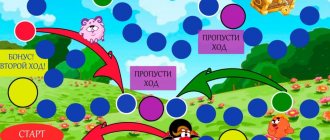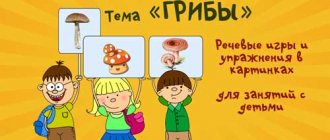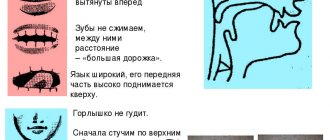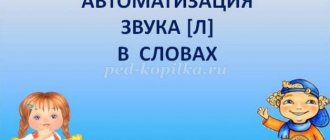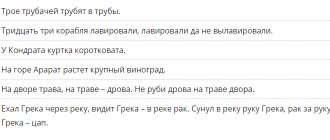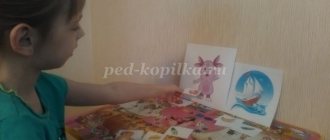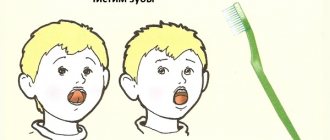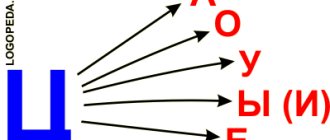We begin automating sounds in words only after the child clearly pronounces an isolated sound and can pronounce it correctly in syllables. We name words, highlighting the automated sound with our voice. We pronounce the words slowly, pronouncing them clearly. It is advisable to repeat the same word 2-3 times.
Articulatory posture: lips are open, it is better to stretch them into a “smile”, so that the teeth are exposed, the teeth are open, the tongue is free, spread out like a “scapula”, the tip is raised to the alveoli or necks of the upper incisors and forms a tight connection with them, the lateral edges of the tongue are lowered and form gaps with the molars through which air passes, the root of the tongue is raised.
Pronounce clearly the sound [l] in syllables, first vertically, then horizontally: la al ala lal lo ol olo lol lu ul ulu lul ly yl yly lyl
We fix the pronunciation of the sound L at the end of words:
oval glass channel collapse pencil case basement station metal capital dump truck angle prick table trunk falcon goat cauldron church football buffalo knot woodpecker Pavel ashes torch newcomer donkey chair basketball
Exercise “Listen. Remember. Repeat"
Ball - small - hall. Collapse - metal - glass. Digged - nodded - yawned. Vol - goal - count. Cauldron - goat - goldfinch. Donkey - cover - football. Torch - woodpecker - ash. He made noise - hissed - walked.
The sound L at the end of a word in a series of words
List of words: Hall, canal, glass, basement, Ball, pencil case, coral, jackal.
List of words: Table, cauldron, goat, goldfinch, Ox, donkey, football, cover.
We fix the pronunciation of the sound L at the beginning of words:
varnish shop lama lamp noodles bast weasel patch palm avalanche swallow lamp forehead crowbar dexterous boat elbow elk vine catch break chunk tray meadow moon puddle meadow Luka lawn bow splint magnifying glass bast crafty
Exercise “Listen. Remember. Repeat"
Bench - paw - lamp. Delicacy - boatman - shopkeeper. Elbow - spoon - boat. Bow - magnifying glass - puddle. Lusha - hole - ray.
Features of sound automation [L]
After the sound is delivered, it should be introduced into free speech. It will take a long time for the child to be able to freely pronounce the sound in his own speech. Repeatedly performing the same articulation will allow the sound to be spoken unconsciously. This process is called automation.
A phoneme cannot be fixed until the child learns to reproduce it accurately in isolation. Before conducting classes to consolidate sound, it is necessary to prepare the muscles of the speech organs by performing special speech therapy exercises. The sounds mixed by the child when talking are automated one by one in different classes.
When a phoneme is omitted, the automation stage occurs quite quickly, since there are no formed conditioned reflex connections in the speech centers of the cerebral cortex; their creation is required. In case of defective pronunciation or when mixing phonemes, these connections already exist; they need to be destroyed, while simultaneously creating a new motor stereotype of correct articulation. In this case, consolidation lasts a long time.
The sound automation process includes certain stages; violation of this stage-by-stage process is not allowed. In uncomplicated cases (with physiological age-related dyslalia), all stages can last only about five minutes.
The sound [L] is automated in the following order:
- Automation of an isolated phoneme.
- Practicing on the material of syllables.
- Consolidation in words.
- Fixing phrases on the material.
- Consolidation in poems.
- Practicing coherent speech.
- Introduction to independent speech.
The sound L at the beginning of a word in a series of words
List of words: Paws, boat, light bulb, elbow, bast shoe, swallow.
List of words: lily of the valley, bench, lamp, spoon, elk, shovel, varnish, palm.
List of words: bow, rays, moon, lawn, horse, lotus, forehead, husky.
We fix the pronunciation of the sound L in the middle of words:
saw bowl spinning top rock shark fist salad robe talent malachite beam squirrel roll jackdaw stick fork shelf needle violet hairpin pin bottle column tent shovel whisk salt shaker lapdog jump rope piggy bank parcel stretcher catch weed weed chop grind hair head gold milk hunger voice cold ear balloon swamp straw column cold rinse half hammer boulder cleaver naughty sheepskin coat dove dove dove beluga Kaluga acorns deck pitchfork saws vacation scarlet cute white cradle wormwood smile Exercise “Listen. Remember. Repeat"
Cases - ash - saw. Robe - salad - rock. Ear - voice - hair. Pin tents are sleds. Swamp - Volodya - breakdown. Hungry - cold - well. Smile - cobblestone - bagpipes.
Automation of isolated sound [L]
First, the articulation of a phoneme needs to be worked out in isolation, that is, separately from other phonemes. At the staging stage and during consolidation, it is important to use auxiliary processes - vision, touch. Based on visual stimuli that the preschooler rarely used or did not use at all, correct visual-motor and auditory-verbal stereotypes are created. The lesson should be conducted in front of a mirror so that the child can see his own face and the face of the teacher to control the correct articulation.
The sound needs to be fixed separately in an interesting playful way. Simply pronouncing a phoneme is not enough for a child to reproduce it correctly - in certain situations, a detailed explanation is required of how to position the organs of the speech apparatus in order to achieve accurate articulation. There are times when using analogies or imitating the actions of the tongue with the palm of your hand is effective. For a long time, it is important to remind the child visually and verbally how to pronounce [L]. When a sound is isolated, familiarization occurs with the letter denoting it.
Russian words ending in L
Reverse Russian dictionary (word endings in L) - Igor Garshin’s website
| Garshin.Ru |
| Lexicons |
[/td]
WriteHome > Zaliznyak's Reverse Dictionary > Words ending in L
Common Slavic roots of Russian: | | | | | E, E, Ѣ | | | | | | | | | | | | | U, Ѫ | | | | | | Yu, i | I, and
Original Russian words: | | | | | E, Yo | | | b, s, b | | |
Foreign borrowings in Russian: | | | | | | | | |
Alphabetical sections of Trubachev's ESSAY : | | | | | | | | | | | | | | | | | | | | | | | | | | | | |
| Russian dictionaries: | Bibliographies: | Etymological | Intelligent | Dialectal | Historical | Regulatory | Terms |
| Dictionaries on the site: | Fasm. | Tsyg. | Shan. | Sem. | Shap. | Shim. | Dahl | Krysin (in.sl.) Ozhegov | Arch. | Novg. | Psk. | SRNG | Academy | Lopatin | Tikhonov | Oil&Gas | Prombez | | GIS |
Words ending with: | | | | | | | | | | | | | | | | | | | | | | | | | | | | | |
- ball
- cannibal
- clavicimbal
- shaft
- blockage
- bulk
- carnival
- collapse
- basement
- semi-basement
- pass
- drilled
- camber
- took root
- halt
- sei whale
- squall
- cymbal
- fin whale
- oval
- snowed
- shabby
- hayloft
- clayed
- fuller
- farrier
- collapse
- on the spot
- shapoval
- felling
- failure
- windfall
- squared
- semi-oval
- narwhal
- serval
- interval
- helm
- stall
- dump truck
- dump
- val
- half shaft
- felt
- bragging
- cover
- self-praise
- fallout
- kagal
- astragalus
- madrigal
- grill
- martingale
- argal
- Kamchadal
- vandal
- scandal
- sandalwood
- shandal
- feudal lord
- ideal
- real
- cash-real
- range
- dagger
- hall
- audience hall
- conference hall
- railway station
- air terminal
- bus station
- antechamber
- cinema hall
- kurhaus
- gym
- dance hall
- branch
- ceremonial
- rial
- imperial
- semi-imperial
- material
- building material
- lumber
- electrical material
- timber
- photographic material
- memorial
- equatorial
- factorial
- curial
- vial
- initial
- official
- differential
- potential
- biopotential
- provincial
- feces
- temper
- intensity
- caracal
- elder
- jackal
- overheated
- radical
- cleric
- vertical
- wineglass
- under-calculated
- rocks
- fiscal
- grin
- scoffer
- lal
- starch
- channel
- signal
- block signal
- echo
- stop signal
- video signal
- radio signal
- light signal
- pencil case
- arsenal
- original
- cardinal
- crime
- denomination
- luminal
- the final
- semi-final
- quarterfinals
- professional
- national
- International
- ammonal
- veronal
- staff
- medical staff
- technical staff
- sulfonal
- magazine
- newsreel
- tribunal
- revolutionary tribunal
- fell
- fuse
- tanned
- municipal
- principal
- opal
- dug
- gummicopal
- homemade
- fell out
- maral
- emergency
- integral
- chinodral
- liberal
- general
- mineral
- admiral
- vice admiral
- admiral general
- rear admiral
- goral
- chloral
- chorale
- corporal
- trawl
- theatergoer
- central
- bromural
- khural
- station wagon
- vassal
- tall
- capital
- Santal
- tantalum
- quintal
- blackened
- red-faced
- drip
- quarter
- portal
- pedestal
- ritual
- intellectual
- halyard
- platyphalic
- brachycephalus
- mesocephalus
- macrocephalus
- microcephaly
- dolichocephalus
- platycephalic
- brachycephalic
- stegocephalus
- mesocephalic
- macrocephal
- microcephalus
- dolichocephalic
- rhynchocephalus
- Bucephalus
- pennant
- impudent
- started
- picked up
- berth
- thought
- set sail
- marshal
- field marshal
- marshal
- white
- shipbuilder
- underbelly
- decibel
- space
- chaff
- Kartvel
- angel
- archangel
- groundwork
- allotment
- manager
- redistribution
- limit
- chapter
- subsection
- word section
- syllable division
- watershed
- aisle
- under-delivery
- bungler
- glassmaker
- buttermaker
- winemaker
- clothmaker
- carpet weaver
- done
- cheese maker
- Department
- health department
- subdepartment
- housing department
- women's department
- financial department
- political department
- technical department
- special department
- lot
- allocation
- goat
- node
- bathroom
- radio center
- waterworks
- torch
- chalk
- ash
- quail
- tripoli
- pennant
- braid pennant
- bogeyman
- Karelian
- Mingrelian
- shot
- shelling
- shelling
- shot
- crossbow
- urchin
- lumbago
- execution
- shooting
- shot
- oxide
- idea
- speculation
- thought
- fishing
- salt production
- oil field
- intent
- fiction
- loops
- celandine
- spit
- woodpecker
- aim
- male
- goat
- half-goat
- eagle
- donkey
- new settler
- calving
- new calf
- first calf
- boiler
- church
- rod
- silt
- ail
- kabil
- moron
- strobil
- crocodile
- aedile
- prolific
- tubeweaver
- sandstone
- old-timer
- alguasil
- dogwood
- keel
- Tamil
- Bogomil
- phenyl
- vinyl
- divinyl
- vinyl chloride
- polyvinyl chloride
- perchlorovinyl
- Zoyl
- notch
- undercut
- cut through
- slept
- sawing
- hamadryad
- mandrill
- tetryl
- nitrile
- carboxyl
- indoxyl
- elecampane
- methyl
- acetyl
- chrysotile
- TNT
- covered
- flooring
- bedding
- self-styled
- spread out
- butyl
- rutile
- ethyl
- Judophile
- bibliophile
- Francophile
- Turkophile
- Anglophile
- psammophile
- thermophile
- Germanophile
- Hellenophile
- Polonophile
- Slavophile
- hygrophilic
- Russophile
- cycle
- epicycle
- biocycle
- motorbike
- point
- Gaul
- coral
- metal
- non-metal
- bimetal
- crystal
- pseudocrystal
- single crystal
- phallus
- Maxwell
- armadillo
- beryl
- chrysoberyl
- mesophyll
- chlorophyll
- sporophyll
- xanthophyll
- roll
- rock'n'roll
- atoll
- hall
- music hall
- penching ball
- handball
- amphibole
- volleyball
- obol
- discus thrower
- motorball
- baseball
- basketball
- football
- pushball
- ox
- arbitrariness
- buffalo
- symbol
- trunk
- devil
- Goal
- verb
- goldfinch
- Mongol
- Buryat-Mongol
- collargol
- protargol
- corner
- dol
- idol
- validol
- solid oil
- amidol
- asidol
- indole
- hem
- continued
- stodol
- quiet
- dry land
- carnelian
- Creole
- halo
- dibazole
- phthalazole
- pyrazole
- sulfazole
- norsulfazole
- podzol
- resol
- perezol
- cresol
- Lysol
- anisole
- camisole
- benzene
- azobenzene
- pyrobenzene
- nitrobenzene
- coxobenzene
- chlorobenzene
- creosol
- otzol
- vizol
- ichthyol
- count
- stabbing
- prick
- funny
- wood splitter
- icebreaker
- thiokol
- bell
- The Tsar Bell
- puncture
- hole puncher
- falcon
- protocol
- stockade
- chipped
- split
- spall
- injection
- guaiacol
- salol
- xylene
- pyrogallol
- they say
- ground
- threshing
- grind
- grinding
- thymol
- mantis
- mantis crab
- unfinished
- flour mill
- grinding
- Komsomol
- osmol
- begged
- rivanol
- methanol
- eugenol
- phenol
- indophenol
- nitrophenol
- carbinol
- pavinol
- floor
- underground
- ramrod
- dome
- roll
- nigrol
- nerol
- calciferol
- styrene
- polystyrene
- airol
- birth
- pyrrole
- sinestrol
- furfural
- safrole
- salting
- Prasol
- salt
- oversalting
- hospitable
- add salt
- insufficient salting
- callus
- pickle
- ambassador
- salting
- hypersol
- brine
- usol
- tol
- skatole
- autol
- metol
- anethole
- menthol
- boromenthol
- table
- throne
- apostle
- naphthol
- benzonaphthol
- axerophthol
- toluene
- nitrotoluene
- trinitrotoluene
- foul
- case
- topknot
- pearl
- schorl
- earl
- jarl
- thought
- fishing
- meaning
- aul
- trunk
- guard
- esaul
- podesaul
- saxaul
- ertaul
- Kabul
- somnambulist
- Beelzebub
- hum
- Agul
- spree
- feeding
- revelry
- pamper
- Vogul
- absenteeism
- time off
- walking
- blew
- oracle
- follicle
- matrix
- vendor code
- diverticulum
- carbuncle
- homunculus
- furuncle
- tubercle
- muscle
- minuscule
- majuscule
- mule
- stimulus
- manul
- pool
- scruple
- consul
- vice consul
- proconsul
- promise
- chapter
- title
- running title
- title
- tarantula
- chair
- blasphemed
- Hutsul
- Chernobyl
- fervor
- dust
- hoof
- rotorcraft
- woolwing
- kiwi
- beaked whale
- starfish
- tubespout
- send
- send
- message
- rear
- yal
home
Slavic roots | Slavic words | Borrowings | Root morphemes | Consoles | Suffixes | Endings | Postfix groups | Function words | Onomatopoeia | Interjections | Bundles of meaning | Word structure and formation | Speech sounds | Spelling | About Russian language
Russian dictionaries: Bibliography of all types | Archive of site dictionaries Other dictionaries: Pronostratic | Proto-Indo-European | Proto-Slavic | Old Church Slavonic | Foreign | Terminological
© “slovorod.ru”, 2012. Igor Konstantinovich Garshin. Subsidiary web project of Igor Garshin's Site. The author and owner of the sites is Igor Konstantinovich Garshin (see author’s resume). Write letters ( ).
Page updated 07/17/2019
Exercises for sound automation [L]
"Steamboat". The child is asked to look at a picture of a steamship and reproduce its whistle. Then you need to help the ship sail to the pier by running your finger along the path, clearly pronouncing the drawn-out sound [L].
"Forest Songs" In front of the child is a drawing depicting wild animals. Opposite each animal is a syllabic path. The child is asked to sing the syllables, imitating the voices of animals.
“Complete the sentence . The adult pronounces sentences. The child is invited to listen to them and add to each sentence a word with the sound [L] that has a suitable meaning. Then you need to repeat the sentences completely, emphasizing the sound [L].
"Find the word" . In front of the child are several pictures with the sound [L] in different parts of the word. The child names what is depicted on them, emphasizing the sound [L]. Then it is proposed to sort the words according to the location of the sound [L] and make a sentence with each word - the name of the picture.
"Fairytale path" The picture shows a fairy-tale character and his castle. The child is asked to lead the character to the castle along a path of syllables.
"Syllabic daisy." The picture shows a chamomile with multi-colored petals. A syllable is written on each petal. The child must read the syllables and form words from them by connecting petals of the same color. Using the resulting words, they make sentences.
Fusion syllables are...
Fusion syllables are usually called combinations of two letters, where the first is always a consonant, and the second is a vowel or a soft sign: “NA”, “PA”, “RE”, “SO”, “Ть”, “Сь”. In fact, each word is a combination of individual letters and merging syllables: “KA-SHA”, “LO-ZH-KA”, “PO-TO-LO-K”. Syllable fusion is a mandatory element of the word reading technique.
To learn to read, you need:
- know all the letters and their corresponding sounds;
- know the direction from where and where to read (from left to right);
- know the fusion syllables characteristic of the language and pronounce them correctly;
- learn to break words into merged syllables and individual letters.
Everyone has heard the expression “read by syllables,” or, as they used to say, “by words.” It was by folding “Az” and “Buki” (“ABC”) that children were taught to read until the nineteenth century. The syllables had to be memorized by heart. But the approach to studying them was too complicated and the methodology was abandoned for some time.
Today, the method of reading by warehouses has been improved and refined. N. A. Zaitsev. The brilliant Russian teacher took ordinary cubes as a basis and placed a letter or word on each side. By learning to read in this way, children do not have difficulty merging individual letters and form words with ease.
General recommendations for audio automation [L]
The correct pronunciation of any speech unit is demonstrated by an adult, and only then repeated by the child. Ideally, he should not make a single mistake when fixing a phoneme, so that an incorrect template does not interfere with the formation of the correct one. Therefore, the teacher must control the pronunciation in order to prevent mistakes and provide hints.
It is extremely important to practice a new phoneme not only in remedial classes, but also in everyday activities. If the sound being studied is pronounced correctly only in class, then “office speech syndrome” appears, when in the presence of a teacher all speech material is pronounced accurately, and the acquired skills are not applied in everyday life.
It is necessary to control the content of the proposed material - there should be no oppositional phonemes. “Conflicting” phonemes can be absolutely any pairs. For each case, it is necessary to select an individual material file. If you encounter such a word or combination, you cannot demand that all sounds be pronounced correctly. Mixed phonemes are distinguished at a special stage of differentiation.
At first, a very exaggerated articulation of the given phoneme is necessary. This is required in order for the auditory analyzer to record the new sound as exemplary.
At first, you need to reinforce the new sound by any means; you cannot give the baby the right to speak it without support and control. Doing homework on your own creates a serious problem. If a child can read, you should not allow him to read the words on his own; an adult must give the correct example, after which the child must reproduce it. It is also important for adults to monitor and correct incorrect pronunciation in everyday life.
